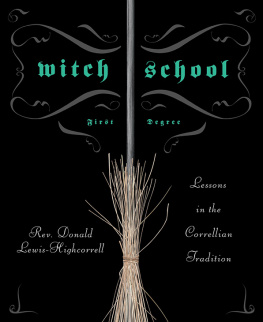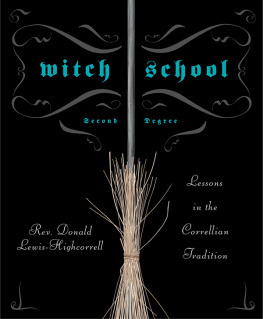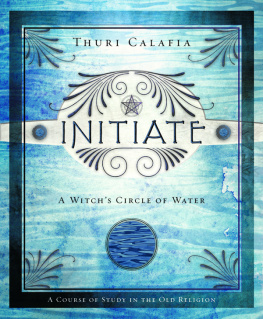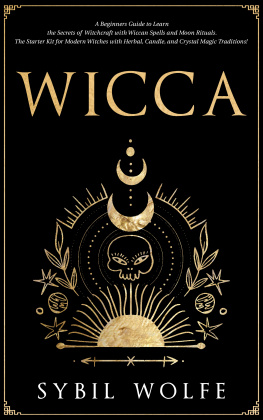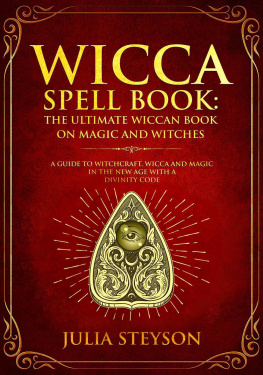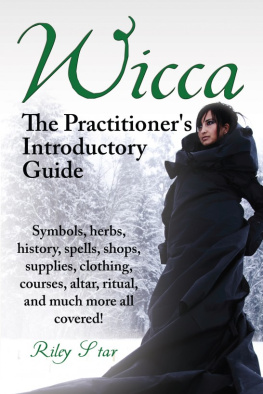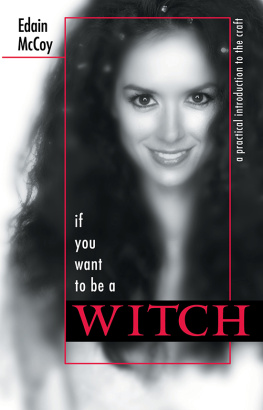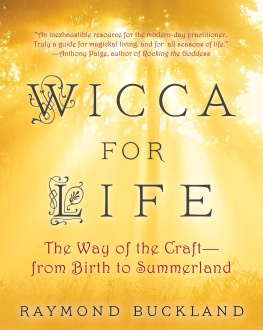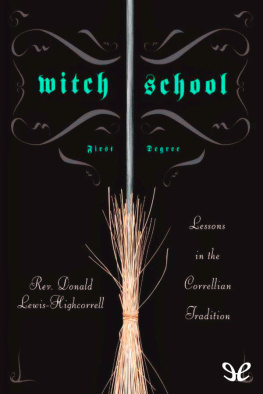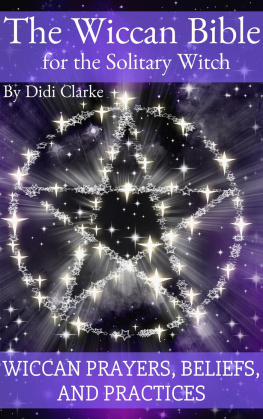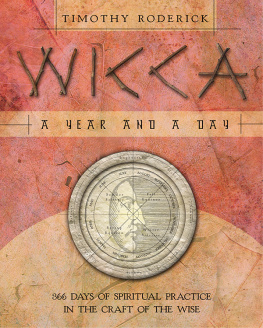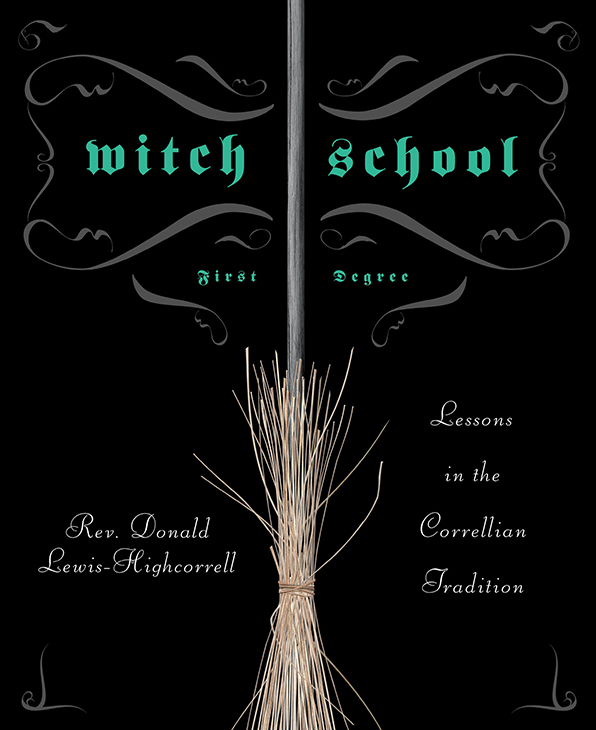Witch School First Degree: Lessons in the Correllian Tradition 2005, 2008 by Rev. Donald Lewis-Highcorrell.
All rights reserved. No part of this book may be used or reproduced in any matter whatsoever, including Internet usage, without written permission from Llewellyn Publications, except in the form of brief quotations embodied in critical articles and reviews.
As the purchaser of this e-book, you are granted the non-exclusive, non-transferable right to access and read the text of this e-book on screen. The text may not be otherwise reproduced, transmitted, downloaded, or recorded on any other storage device in any form or by any means.
Any unauthorized usage of the text without express written permission of the publisher is a violation of the authors copyright and is illegal and punishable by law.
Cover design by Kevin R. Brown
Interior priest and priestess illustrations from Dover Publications; other interior artwork by Llewellyn Art Department
Llewellyn Publications is an imprint of Llewellyn Worldwide Ltd.
Llewellyn Publications does not participate in, endorse, or have any authority or responsibility concerning private business arrangements between our authors and the public.
Any Internet references contained in this work are current at publication time, but the publisher cannot guarantee that a specific reference will continue or be maintained. Please refer to the publishers website for links to current author websites.
Llewellyn Worldwide Ltd.
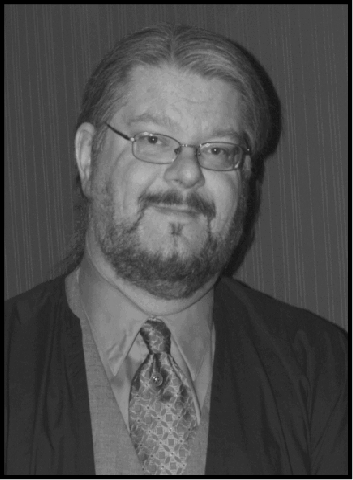
Photo Debbe Tompkins
About the Author
Rev. Donald Lewis-Highcorrell (Illinois) is the CEO of Witch School International, the largest online school of Witchcraft and Wicca. He is also the long-seated First Priest and Chancellor of the Correllian Nativist Tradition and principal author of the traditions degree materials. Rev. Lewis-Highcorrell co-founded the Pagan Interfaith Embassy, where he serves as a Pagan Interfaith Ambassador to the United States. He is currently the studio head of Magick TV and producer and host of Living the Wiccan Life .
Contents
Lesson I:
Lesson II:
Lesson III:
Lesson IV:
Lesson V:
Lesson VI:
Lesson VII:
Lesson VIII:
Lesson IX:
Lesson X:
Lesson XI:
Lesson XII:
: Self-Wiccaning Ritual
: The Charge of the Goddess
T his book is dedicated to Reverend Traci Logan Wood, chief priestess of Holy City Temple, Chicago, without whose persistent encouragement and support it would not have been possible. Many thanks to her for continual aid and patience.
Preface
G reetings,
I am very pleased to be able to present this new, revised edition of my Correllian Tradition lessons. The creation of these materials took many years, and the new edition has taken many months, but at last I feel that we can call them completed. I think it is particularly appropriate that this new edition, long in the working, has been completed at the dawn of the year 7 Aquarius (AD 2007), with its numerical emphasis on spirituality and learning.
Of course, because peoples needs and circumstances are in a constant state of change, it is only reasonable to assume that there will, in the future, be additions to these materials, but I think we can regard the basic form of Correllian Degree education to be established.
When I began writing these materials, the Correllian Tradition was a tiny familial tradition of Witchcraft. What I mean by Witchcraft in this usage is a relatively unorganized Pagan religious practice involving magic and spiritualism.
In my writings, I have always treated the term Wicca as synonymous with the word Witchcraft as it is defined above. This is what I was taught, and treating these terms as equal has been common practice for many in the United States, especially during the period when I was learning. Many people now use a much more limited definition of Wicca, confining the term to the Gardnerian-Alexandrian traditions; however, it is important for students to realize that this is not how the word Wicca will be used in these writings.
The Correllian Tradition considers itself to be Nativista word roughly synonymous with Pagan. In 1579 Pisces (AD 1979), the elders of the tradition decided it was a form of Wiccaagain, thinking of the term as synonymous with Witchcraft as described above. The wisdom of this is now questionable, and the decision certainly has been subject to a great deal of criticism by people who note the many differences between Correllianism and Gardnerian-Alexandrian Wicca. Nonetheless, the tradition has styled itself Wiccan ever since, and it will continue to do so until and unless the elders decide differently.
Ultimately, however, we consider Correllianism to be something unto itself: a lens through which all things may be seen. Though influenced by the movements it has grown up among and at times identified itself with, the Correllian understanding of the Universe is, ultimately, simply Correllian.
In setting forth the Correllian understanding in writing, it has always been my intention that the materials should be available to all seekers, whether Correllian themselves or not. I do not believe that we are given spiritual insight so that we can hoard it for ourselves or hold it back from others who could benefit. If a better understanding of Spirit makes one a better person, then sharing spiritual understanding should make a better world.
I hope that you find this new edition of the Correllian Tradition lessons interesting and useful in your personal spiritual journey.
May the blessing be upon you,
Rev. Donald Lewis-Highcorrell
First Priest and Chancellor,
Correllian Nativist Tradition
Introduction
S o you want to be a witch?
What is all this witchcraft stuff, anyway? Does being a witch mean you can point your finger and make things happen? Does it mean you can learn to fly on a broom and turn people into toads?
Well, not quite.
Witchcraft, or Wicca , is a religion. Wicca is not primarily about magic, although it does use magic. Wicca is about your place in the Universe and your evolution as a spiritual being. Wicca is about moving forward on your personal spiritual journeyabout learning, growing, and becoming the most you can be. As a religion, Wicca is a way of understanding and interacting with Deity and the Universe. It is a life-affirming path of growth and expansion .
Wicca is based on reverence for Nature and her cycles and respect for the earth and all her creatures. Wicca teaches us to revere the natural forces of the Universe and allow us to see them reflected in the world around us, in every person and thing.
Wicca has great reverence for Deity, who for us has both a Mother and Father aspect. Wiccans approach Deity through many names and formsboth masculine and feminine, and drawn from all over the world and from every age. We often compare Deity to a diamond with many facets: each name or image for Deity is like one facet of the diamond. Each facet may be considered separately, and all are beautiful in themselves, but yet they all are aspects of a single stone.

